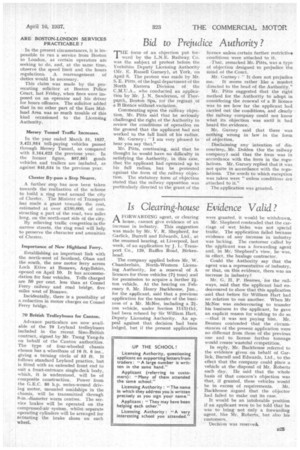Is Clearing-house Evidence Valid?
Page 39

If you've noticed an error in this article please click here to report it so we can fix it.
A FORWARDING agent, or clearing
house, cannot give evidence of an increase in industry. This suggestion was made by Mr. V. R. Shepherd, for Garlick, Burrell and Edwards, Ltd., at the resumed hearing, at Liverpool, last week, of an application by J. L. Transport Co., 120, Raffles Road, Birkenhead, . The company applied before Mr, W. Chamberlain, North-Western Licensing Authority, for a renewal of A licences for three vehicles (71 tons) and for permission to acquire a further 2ton vehicle. At the hearing on February 9, Mr. Henry Backhouse, Jun., for the applicant, said that a previous application for the transfer of the business of a Mr. McNee, including a 21ton vehicle, under Section 11(3) (b), had been refused by Sir William Hart, Deputy Licensing Authority. An appeal against that decision had been lodged, but if the present application
were granted, it -would be withdrawn.
Mr. Shepherd contended that the carriage of wet hides was not special traffic. The application failed because evidence of any increase in industry was lacking. The customer called by the applicant was a forwarding agent and, in Mr. Shepherd's view, he was, in effect, the haulage contractor.
Could the Authority say that the agent was a representative of industry, or that, on this evidence, there was an increase in industry?
Mr. G. H. P. Beames, for the railways, said that the applicant had endeavoured to show that this application and that before Sir William Hart bad no relation to one another. When Mr McNee was endeavouring to transfer his business to the applicant, he gave an explicit reason for wishing to do so —that it was not paying him. Mr. 1-3eames contended that the circumstances of the present application were no different from those of the previous one and to license further tonnage would create wasteful competition.
In reply, Mr. Backhouse referred to the evidence given oil behalf of Garlick, Burrell and Edwards, Ltd., to the effect that the company could place a vehicle at the disposal of Mr. Roberts each day. He said that the whole basis of that concern's objection was that, if granted, these vehicles would be in excess of requirements. . Mr. Backhouse argued that the objector had failed to make out its case.
It would be an intolerable position if an applicant were to be told that he was tobring not only a forwarding agent, like Mr. Roberts, but also his customers.
Decision was reserved.




























































































